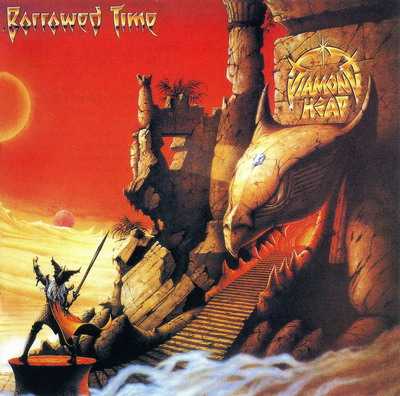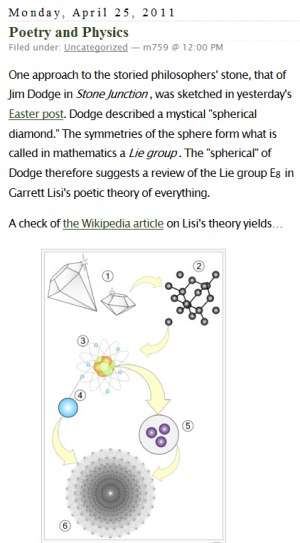Also on July 30 . . .
Wednesday, August 3, 2022
From the “Shifting Phantasmagoria” of Joan Didion
Friday, April 23, 2010
Phantasmagoria
Today's NY Times obituaries —

Warnecke died April 17, last Saturday.
From an entry linked to on that date —
|
"I was reading Durant's section on Plato, struggling to understand his theory of the ideal Forms that lay in inviolable perfection out beyond the phantasmagoria. (That was the first, and I think the last, time that I encountered that word.)" |
|
"We tell ourselves stories in order to live…. We interpret what we see, select the most workable of multiple choices. We live entirely, especially if we are writers, by the imposition of a narrative line upon disparate images, by the 'ideas' with which we have learned to freeze the shifting phantasmagoria which is our actual experience." |
Happy Shakespeare's birthday.
Monday, August 30, 2021
Saturday, September 23, 2017
The Turn of the Year
Friday, September 23, 2016
Annals of Scientism
Last night, Thursday, Sept. 22, 2016, at Harvard's Sanders Theatre,
the annual Ig Nobel prizes were awarded.
This journal earlier that day —
Related material —
Thursday, September 22, 2016
Sunday, November 9, 2014
Sermon
The Ideas
| “We tell ourselves stories in order to live…. We interpret what we see, select the most workable of multiple choices. We live entirely, especially if we are writers, by the imposition of a narrative line upon disparate images, by the ‘ideas’ with which we have learned to freeze the shifting phantasmagoria which is our actual experience.” — Joan Didion |
See Didion and the I Ching and posts tagged Plato in China .
Tuesday, October 7, 2014
Principles of Aesthetics
Or: Phantasmagoria Meets Pandemonium
Part I: Phantasmagoria
Rebecca Goldstein on first encountering Plato —
| “I was reading Durant’s section on Plato, struggling to understand his theory of the ideal Forms that lay in inviolable perfection out beyond the phantasmagoria. (That was the first, and I think the last, time that I encountered that word.)” |
| “We tell ourselves stories in order to live….We interpret what we see, select the most workable of multiple choices. We live entirely, especially if we are writers, by the imposition of a narrative line upon disparate images, by the ‘ideas’ with which we have learned to freeze the shifting phantasmagoria which is our actual experience.” |
Part II: Pandemonium
Terry Teachout in Commentary on Oct. 1, 2014:
“When making art or writing about it, the aesthete
tries never to moralize. Nor will he look with favor
upon artists who do so, no matter whether their
particular brand of moralizing is religious or secular.
But he can and must be fully, intensely alive to the
moral force of art whose creators aspire merely to
make the world around us more beautiful, and in
so doing to pierce the veil of the visible and give us
a glimpse of the permanently true. That is his job:
to help make sense of the pandemonium amid which
we live.”
Rivka Galchen in The New York Times Sunday Book Review
issue of October 5, 2014 (online Sept. 30):
“The story describes honestly something that is,
which is very different from proposing what ought to be.”
See also Pandemonium in this journal.
Wednesday, September 24, 2014
Ideas
“We tell ourselves stories in order to live.
The princess is caged in the consulate.
The man with the candy will lead the children into the sea.
The naked woman on the ledge outside the window
on the sixteenth floor is a victim of accidie, or
the naked woman is an exhibitionist, and it would be
‘interesting’ to know which. We tell ourselves that it makes
some difference whether the naked woman is about to
commit a mortal sin or is about to register a political protest
or is about to be, the Aristophanic view, snatched back to the
human condition by the fireman in priest’s clothing just visible
in the window behind her, the one smiling at the telephoto lens.
We look for the sermon in the suicide, for the social or moral
lesson in the murder of five. We interpret what we see, select
the most workable of the multiple choices. We live entirely,
especially if we are writers, by the imposition of a narrative line
upon disparate images, by the ‘ideas’ with which we have learned
to freeze the shifting phantasmagoria which is our actual
experience.”
This evening’s New York Lottery: 659 and 7326.
Tuesday, August 5, 2014
The Omega Story
|
"We tell ourselves stories in order to live…. We interpret what we see, select the most workable of multiple choices. We live entirely, especially if we are writers, by the imposition of a narrative line upon disparate images, by the 'ideas' with which we have learned to freeze the shifting phantasmagoria which is our actual experience." |
See also a post from May 4, 2011 (the date, according to a Google
search, of untitled notes regarding a matrix called Omega).
Monday, December 31, 2012
Holiday Philosophy
Obituaries for New Year's Eve—
A link from Christmas Day—
Easter meditations—

See also…
- Valéry's reference to "a broken phrase by Pascal,"
- The shattered rock of a Wallace Stevens critic, and
- Pascal's diamond.
Tuesday, December 25, 2012
Wednesday, May 4, 2011
Tuesday, May 3, 2011
Phantasmagorical Touchstone
"Ira Cohen made phantasmagorical films that became cult classics….
In certain artistic and literary circles, Mr. Cohen was a touchstone"
— Douglas Martin in the online New York Times on May 1, 2011
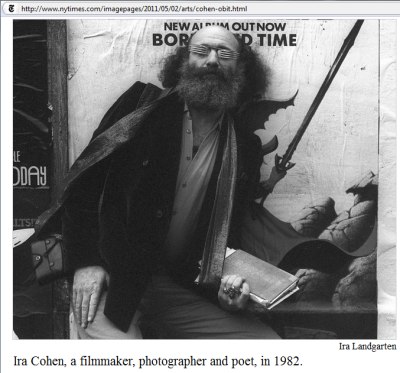
The rest of the picture—
"Borrowed Time," a 1982 album by Diamond Head
It is said that the touchstone died at 76 on April 25 (Easter Monday).
See that date in this journal. See also Phantasmagoria.
The above-mentioned Easter post—
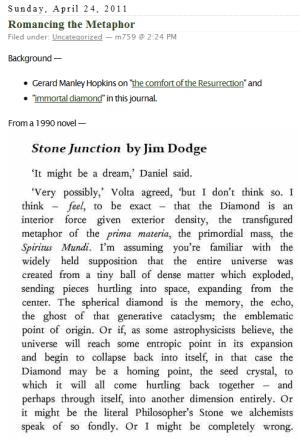
Wednesday, May 28, 2008
Wednesday May 28, 2008
Mockingbird
|
CelebritySexNews.com
on Kylie Minogue:
From a web page on
you gotta ride it like you find it. Get your ticket at the station of the Rock Island Line.  in Rock Island, Illinois |
Related material:
Twenty-First Century Fox
(10/6/02)
Back to You, Kylie
(11/5/02)
Time, Eternity, and Grace
(11/22/02)
That Old Devil Moon
(1/1/03) and
The Shanghai Gesture
(1/3/03)
Whirligig
(1/5/03)
Harrowing
(4/19/03)
Temptation
(4/22/03)
Temptation
(4/9/04)
Tribute,
Train of Thought,
Drunk Bird, and
From Here to Eternity
(8/17/04-8/18/04)
Heaven and Earth
(9/2/04)
Habeas Corpus
(11/24/04)
X, continued
(12/4/04)
Birth and Death
(5/28/05)
Time Travel
(5/28/06)
Timeagain and
Two-Bar Hook
(8/9/06)
Echoes
(8/11/06)
Phantasmagoria
and Tequila!
(9/23/06)
Wednesday, March 5, 2008
Wednesday March 5, 2008
For CENTRAL
Central Intelligence:
"God does not play dice."
— Paraphrase of a remark
by Albert Einstein
Another Nobel Prize winner,
Isaac Bashevis Singer—
"a God who speaks in deeds,
not in words, and whose
vocabulary is the Cosmos"
From "The Escapist:
The Reality of Fantasy Games"–

Dungeons & Dragons Dice
From today's New York Times:
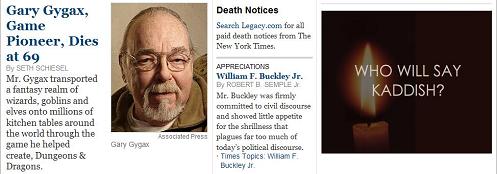
A Kaddish for Gygax:
| "I was reading Durant's section on Plato, struggling to understand his theory of the ideal Forms that lay in inviolable perfection out beyond the phantasmagoria. (That was the first, and I think the last, time that I encountered that word.)" |
Related material:
For more on the word
"phantasmagoria," see
Log24 on Dec. 12, 2004
and on Sept. 23, 2006.
For phantasmagoria in action,
see Dungeons & Dragons
and Singer's (and others')
Jewish fiction.
For non-phantasmagoria,
see (for instance) the Elements
of Euclid, which culminates
in the construction of the
Platonic solids illustrated above.
See also Geometry for Jews.
Wednesday, October 24, 2007
Wednesday October 24, 2007
A Story for Dobbs
Internet Movie Database on screenwriter Lem Dobbs:
"Trivia:
Son of painter R.B. (Ron) Kitaj.
Took his pseudonym from the character Humphrey Bogart played
in 'The Treasure of the Sierra Madre.'"

October 21 was the day
that R. B. Kitaj died.
For what Kitaj called
"midrashic glosses"
on the numbers and
the lucky sums, see
4/30, 5/12, and
Eight is a Gate.
"We tell ourselves stories in order to live….
We interpret what we see, select the most workable of multiple choices. We live entirely, especially if we are writers, by the imposition of a narrative line upon disparate images, by the 'ideas' with which we have learned to freeze the shifting phantasmagoria which is our actual experience.
Or at least we do for a while. I am talking here about a time when I began to doubt the premises of all the stories I had ever told myself, a common condition but one I found troubling."
"He has come to be fascinated… by the kabbalah, finding in it parallels to the world of art and ideas. Every morning, after a long walk, he winds up at a Westwood café surrounded by pretty UCLA students where he studies the writings of Emmanuel Levinas, before working for an hour on his memoirs."
"There is no teacher
but the enemy."
— Orson Scott Card,
Ender's Game
Monday, July 23, 2007
Monday July 23, 2007
is 18 today.

Greetings.
“The greatest sorcerer (writes Novalis memorably)
would be the one who bewitched himself to the point of
taking his own phantasmagorias for autonomous apparitions.
Would not this be true of us?”
–Jorge Luis Borges, “Avatars of the Tortoise”
“El mayor hechicero (escribe memorablemente Novalis)
sería el que se hechizara hasta el punto de
tomar sus propias fantasmagorías por apariciones autónomas.
¿No sería este nuestro caso?”
–Jorge Luis Borges, “Los Avatares de la Tortuga“
At Midsummer Noon:
|
|
It is not enough to cover the rock with leaves. We must be cured of it by a cure of the ground Or a cure of ourselves, that is equal to a cure
Of the ground, a cure beyond forgetfulness.
And if we ate the incipient colorings – Wallace Stevens, “The Rock” |
Gödel and Escher and Bach
were only shadows
cast in different directions by
some central solid essence.
I tried to reconstruct
the central object, and
came up with this book.”
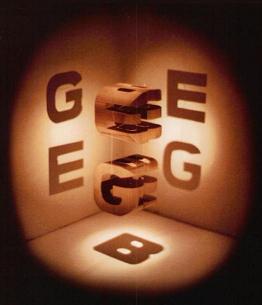
Hofstadter’s cover.
“shadows” of a sort,
derived from a different
“central object”:
Friday, March 2, 2007
Friday March 2, 2007
Goddess vs. Alphabet
| "I was reading Durant's section on Plato, struggling to understand his theory of the ideal Forms that lay in inviolable perfection out beyond the phantasmagoria. (That was the first, and I think the last, time that I encountered that word.)" |
Part I: Phantasmagoria

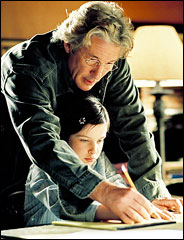
Photo by Phil Bray
Transcendence through spelling:
Richard Gere and Flora Cross
as father and daughter
in the film of Bee Season.
"Every aspect of the alef's
construction has been
Divinely designed
to teach us something."
— Alef– The Difference Between
Exile And Redemption,
by Rabbi Aaron L. Raskin
Related material–
Art Theory for Yom Kippur
and
Log24 entries, Nov. 2005.
Part II: Hunt for the Real
The Alphabet Versus the Goddess:
The Conflict Between Word and Image.
See also the references
to Zelazny's Eye of Cat
in the Nov. 2005 entries
as well as
today's previous entry—
with the Norton Simon motto
"Hunt for the best"– and…
— Arthur Lubow in The New York Times, Feb. 25, 2007
Tuesday, December 5, 2006
Tuesday December 5, 2006
Today in History
(via The Associated Press)
|
On this date (Dec. 5): In 1776, the first scholastic fraternity in America, Phi Beta Kappa, was organized at the College of William and Mary in Williamsburg, Va. In 1791, composer Wolfgang Amadeus Mozart died in Vienna, Austria, at age 35. In 2006, author Joan Didion is 72. |
“We tell ourselves stories in order to live….
We interpret what we see, select the most workable of multiple choices. We live entirely, especially if we are writers, by the imposition of a narrative line upon disparate images, by the ‘ideas’ with which we have learned to freeze the shifting phantasmagoria which is our actual experience.
Or at least we do for a while. I am talking here about a time when I began to doubt the premises of all the stories I had ever told myself, a common condition but one I found troubling.”
An Alternate History
(based on entries of
the past three days):
“A FAMOUS HISTORIAN:
England, 932 A.D. —
A kingdom divided….”
|
A Story That Works
|
Tuesday, October 31, 2006
Tuesday October 31, 2006
From 7/07, an art review from The New York Times:
Endgame Art?
It's Borrow, Sample and Multiply
in an Exhibition at Bard College
"The show has an endgame, end-time mood….
I would call all these strategies fear of form…. the dismissal of originality is perhaps the oldest ploy in the postmodern playbook. To call yourself an artist at all is by definition to announce a faith, however unacknowledged, in some form of originality, first for yourself, second, perhaps, for the rest of us.
Fear of form above all means fear of compression– of an artistic focus that condenses experiences, ideas and feelings into something whole, committed and visually comprehensible."
— Roberta Smith
would consider the
following "found" art an
example of originality.
It nevertheless does
"announce a faith."

"First for yourself"
Today's mid-day
Pennsylvania number:
707
See Log24 on 7/07
and the above review.
"Second, perhaps,
for the rest of us"
Today's evening
Pennsylvania number:
384
This number is an
example of what the
reviewer calls "compression"–
"an artistic focus that condenses
experiences, ideas and feelings
into something
whole, committed
and visually comprehensible."
"Experiences"
See (for instance)
Joan Didion's writings
(1160 pages, 2.35 pounds)
on "the shifting phantasmagoria
which is our actual experience."
"Ideas"
"Feelings"
See A Wrinkle in Time.
"Whole"
The automorphisms
of the tesseract
form a group
of order 384.
"Committed"
See the discussions of
groups of degree 16 in
R. D. Carmichael's classic
Introduction to the Theory
of Groups of Finite Order.
"Visually comprehensible"
See "Diamond Theory in 1937,"
an excerpt from which
is shown below.

The "faith" announced by
the above lottery numbers
on All Hallows' Eve is
perhaps that of the artist
Madeleine L'Engle:
Saturday, September 23, 2006
Saturday September 23, 2006
|
“A corpse will be — Under the Volcano,
“It has a ghastly familiarity,
like a half-forgotten dream.” — Poppy (Gene Tierney) in |
|
Temptation
|
|
“We tell ourselves stories in order to live…. We interpret what we see, select the most workable of multiple choices. We live entirely, especially if we are writers, by the imposition of a narrative line upon disparate images, by the ‘ideas‘ with which we have learned to freeze the shifting phantasmagoria which is our actual experience. Or at least we do for a while. I am talking here about a time when I began to doubt the premises of all the stories I had ever told myself, a common condition but one I found troubling.” From Patrick Vert, “There are plenty of anecdotes to highlight the personal, phenomenological experience of railway passage… … a unique study on phantasmagoria and the history of imagination. The word originates [in] light-projection, the so-called ghost-shows of the early 19th century…. … thought becomes a phantasmagorical process, a spectral, representative location for the personal imagination that had been marginalized by scientific rationalism…. This phantasmagoria became more mediated over time…. Perception became increasingly visually oriented…. As this occurred, a narrative formed to encapsulate the phenomenology of it all….” For such a narrative, see |
| From a Christian fairy tale:
Aslan’s last words come at the end of The Last Battle: ‘There was a real railway accident […] Your father and mother and all of you are–as you used to call it in the Shadow-Lands–dead. The term is over: the holidays have begun. The dream is ended: this is the morning.’…. Aslan is given the last word in these quiet but emphatic lines. He is the ultimate arbiter of reality: “‘There was a real railway accident.'” Plato, in addition to the Christian tradition, lies behind the closing chapters of The Last Battle. The references here to the Shadowlands and to the dream refer back to an earlier explanation by Digory, now the Lord Digory: “[…] that was not the real Narnia. That had a beginning and an end. It was only a shadow or a copy of the real Narnia, which has always been here and always will be here: just as our world, England and all, is only a shadow or copy of something in Aslan’s real world. [….] Of course it is different; as different as a real thing is from a shadow or as waking life is from a dream. […] It’s all in Plato, all in Plato: bless me, what do they teach them at these schools!” |
| “I was reading Durant’s section on Plato, struggling to understand his theory of the ideal Forms that lay in inviolable perfection out beyond the phantasmagoria. (That was the first, and I think the last, time that I encountered that word.)” |
Whether any of the above will be of use in comforting the families of those killed in yesterday morning’s train wreck in Germany is not clear. Pope Benedict XVI, like C. S. Lewis, seems to think Greek philosophy may be of some use to those dealing with train wrecks:
| “Modifying the first verse of the Book of Genesis, the first verse of the whole Bible, John began the prologue of his Gospel with the words: ‘In the beginning was the logos.‘ This is the very word used by the emperor: God acts, syn logo, with logos. Logos means both reason and word– a reason which is creative and capable of self-communication, precisely as reason. John thus spoke the final word on the biblical concept of God, and in this word all the often toilsome and tortuous threads of biblical faith find their culmination and synthesis. In the beginning was the logos, and the logos is God, says the Evangelist.”
— Remarks of the Pope at the University of Regensburg on Sept. 12, 2006 |
Friday, December 16, 2005
Friday December 16, 2005
A Wintry Friday Afternoon
Three years ago today in the New York Times:
“The book was Will Durant’s Story of Philosophy, and I was 12 or 13 when I carried it home from the library one wintry Friday afternoon.
I cannot even remember the novel that accompanied it. But I remember that I was curled up on our beat-up old couch, the one with the huge embarrassing rip where my older sister would position me to sit demurely, my dress fanned out over the damage, when her dates arrived. I was reading Durant’s section on Plato, struggling to understand his theory of the ideal Forms that lay in inviolable perfection out beyond the phantasmagoria. (That was the first, and I think the last, time that I encountered that word.)
The Forms are abstract but real, I read, graspable only through the eyes of the mind, pure reason. And it seemed to me, that dark winter afternoon as I read, that I was grasping them; that I, a yiddishe maidel of questionable worth, was seeing with the eyes of my mind exactly what that ancient Greek philosopher had seen; that just like him I was out beyond the phantasmagoria, suspended in formal perfection; that I was out beyond myself, had almost lost all touch with who I even was, and it was . . . bliss.”
— Rebecca Goldstein
Related material:
Davenport’s Express.Update of 6:14 PM EST:
Whistle Stop

For the late John Spencer,
actor on NBC’s “West Wing”— “When was the last time
you went to a meeting?”
— “AA?…. What meeting
could I possibly go to?”
— “Mine.”
Saturday, May 21, 2005
Saturday May 21, 2005
“Finally, there is the matter of players
changing history as she is writ.”
— “Historical Fantasy Campaigns
for Role Playing Simulations,”
published in Phantasmagoria,
Murdoch Alternative Reality
Society Annual, 2004, pp. 32-38

Franken is best known as the author of
Lies and the Lying Liars Who Tell Them.
Sunday, December 12, 2004
Sunday December 12, 2004
Ideas, Stories, Values:
Literati in Deep Confusion
“We tell ourselves stories in order to live….
We interpret what we see, select the most workable of multiple choices. We live entirely, especially if we are writers, by the imposition of a narrative line upon disparate images, by the ‘ideas‘ with which we have learned to freeze the shifting phantasmagoria which is our actual experience.
Or at least we do for a while. I am talking here about a time when I began to doubt the premises of all the stories I had ever told myself, a common condition but one I found troubling.”
Interview with Joseph Epstein:
“You can do in stories things that are above those in essays,” says Epstein. “In essays and piecework, you are trying to make a point, whereas in stories you are not quite sure what the point is. T.S. Eliot once said of Henry James, ‘He had a mind so fine no idea could violate it,’ which, I think, is the ultimate compliment for an author. Stories are above ideas.”
Harvard President Lawrence H. Summers, Sept. 12, 2004:
“You are entering a remarkable community, the Harvard community. It is a community built on the idea of searching for truth… on the idea of respect for others….
… we practice the values we venerate. The values of seeking truth, the values of respecting others….”
“… Hegel discusses ‘culture’ as the ‘world of self-alienated spirit.’ The idea seems to be that humans in society not only interact, but that they collectively create relatively enduring cultural products (stories, dramas, and so forth) within which they can recognise their own patterns of life reflected.”
The “phantasmagoria” of Didion seems related to the “phenomenology” of Hegel…
From Michael N. Forster, Hegel’s Idea of a Phenomenology of Spirit:
“This whole system is conceived, on one level at least, as a defense or rational reworking of the Christian conception of God. In particular, its three parts are an attempt to make sense of the Christian idea of a God who is three in one — the Logic depicting God as he is in himself, the Philosophy of Nature God the Son, and the Philosophy of Spirit God the Holy Spirit.”
and, indeed, to the phenomenology of narrative itself….
From Patrick Vert,
The Narrative of Acceleration:
“There are plenty of anecdotes to highlight the personal, phenomenological experience of railway passage…
… a unique study on phantasmagoria and the history of imagination. The word originates [in] light-projection, the so-called ghost-shows of the early 19th century….
… thought becomes a phantasmagorical process, a spectral, representative location for the personal imagination that had been marginalized by scientific rationalism….
Truly, ‘immediate experience is [or becomes] the phantasmagoria of the idler’ [Walter Benjamin, The Arcades Project. Cambridge: Harvard University Press, 1999. Page 801.]….
Thought as phantasm is a consequence of the Cartesian split, and… a further consequence to this is the broad take-over of perceptual faculty…. What better example than that of the American railway? As a case-study it offers explanation to the ‘phantasmagoria of the idler’….
This phantasmagoria became more mediated over time…. Perception became increasingly visually oriented…. As this occurred, a narrative formed to encapsulate the phenomenology of it all….”
For such a narrative, see
the Log24.net entries of
November 5, 2002, 2:56 AM,
November 5, 2002, 6:29 AM,
January 3, 2003, 11:59 PM,
August 17, 2004, 7:29 PM,
August 18, 2004, 2:18 AM,
August 18, 2004, 3:00 AM, and
November 24, 2004, 10:00 AM.
Tuesday, December 7, 2004
Tuesday December 7, 2004
White Christmas
Starring W. V. Quine as
the Ghost of Christmas Past
“Birthday, death-day —
what day is not both?”
— John Updike
“We tell ourselves stories in order to live….
We interpret what we see, select the most workable of multiple choices. We live entirely, especially if we are writers, by the imposition of a narrative line upon disparate images, by the ‘ideas’ with which we have learned to freeze the shifting phantasmagoria which is our actual experience.
Or at least we do for a while. I am talking here about a time when I began to doubt the premises of all the stories I had ever told myself, a common condition but one I found troubling.”











